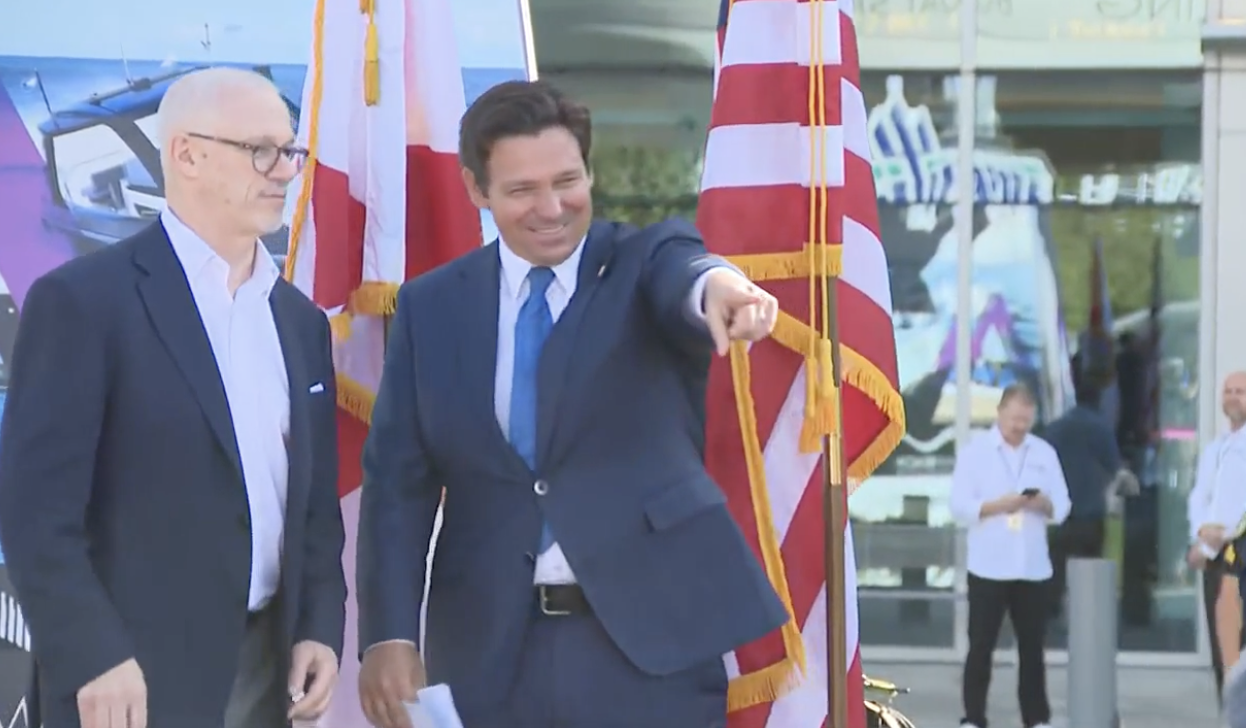What is electioneering? Is it legal? Is it ethical?
Please Follow us on Gab, Minds, Telegram, Rumble, Truth Social, Gettr, Twitter
Most people would agree that using taxpayer funds to buy the pens that voters use to color in their voting positions at the polls is an acceptable use of taxpayer money.
How about if the pens purchased had the Supervisor of Elections name on them? This was seen in Hillsborough County Florida. Craig Latimer purchased 1.2 Million pens used to fill in voting positions at a cost of about $350K.

That is quite the expenditure for writing utensils that would also be electioneering materials within polling places.
Why would the Supervisor of Elections need to put their name on everything that the Supervisor of Elections Office uses?
This is “TAXPAYER PROPERTY” is it not?
What happens when the old supervisor of elections is no longer in office? Does this mean that the county taxpayers will be forced to buy “NEW PENS” without Craig Latimer’s name on them?
Why are taxpayers paying for marketing materials for incumbent candidates?
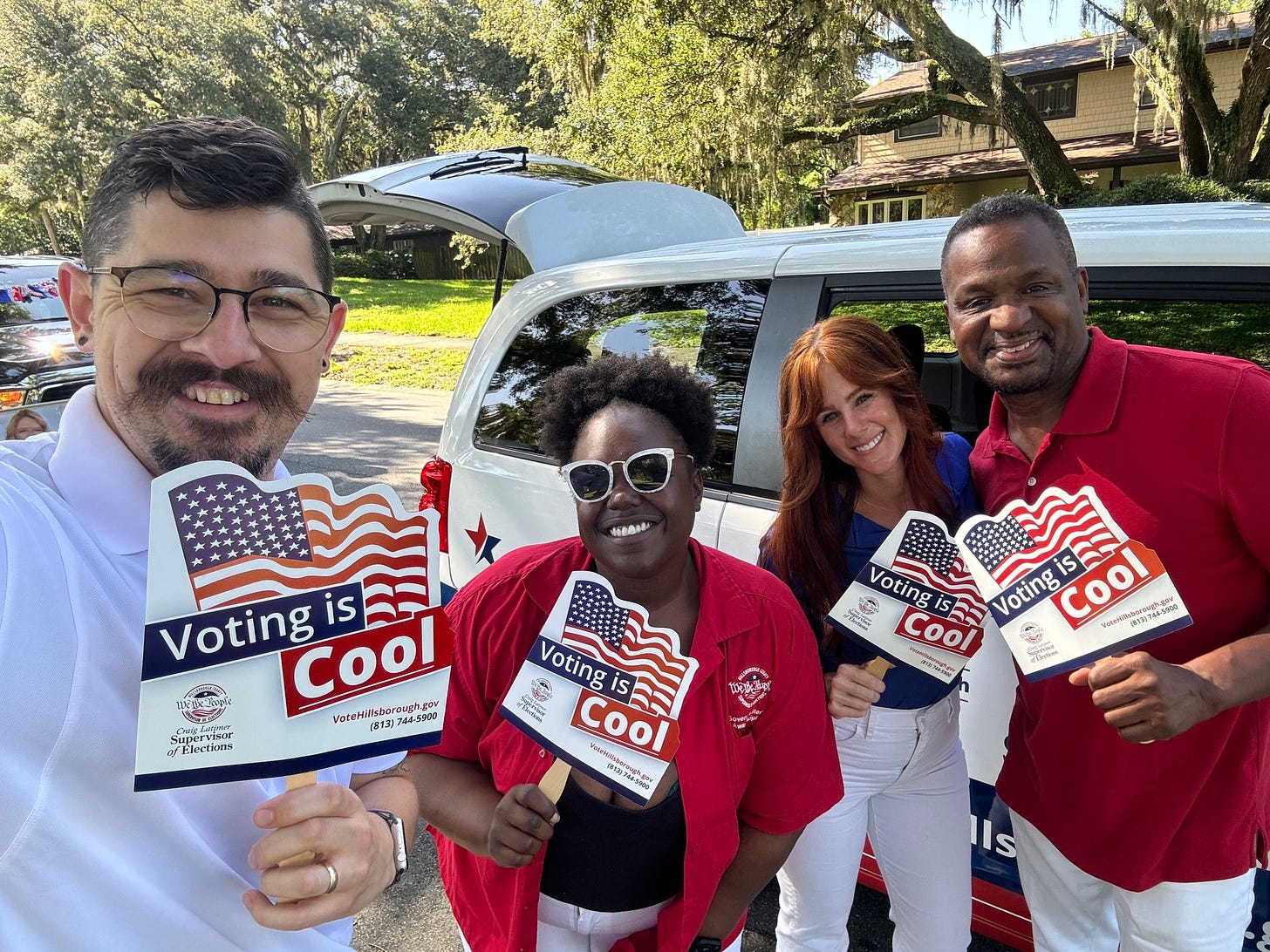
Candidate Craig Latimer from Hillsborough County bought these cool fans for the 4th of July Parade. They handed them out to the public…During an election year.
That was quite the campaign marketing expenditure to help build awareness and name recognition wasn’t it?
How about buying vans with taxpayer money and having candidate Craig Latimer’s name plastered all over it? What does a wrap of a van cost?
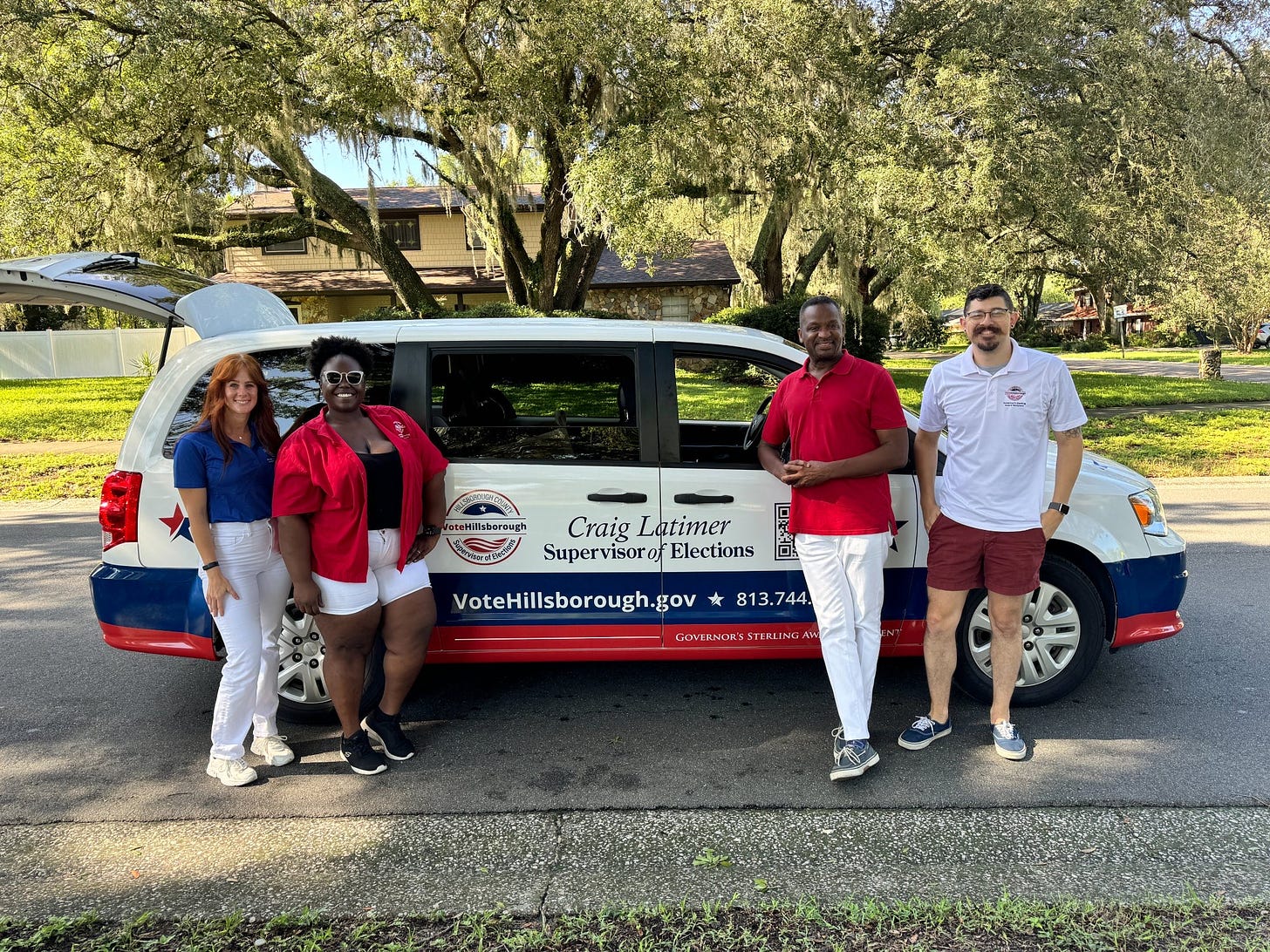
How about coozies?
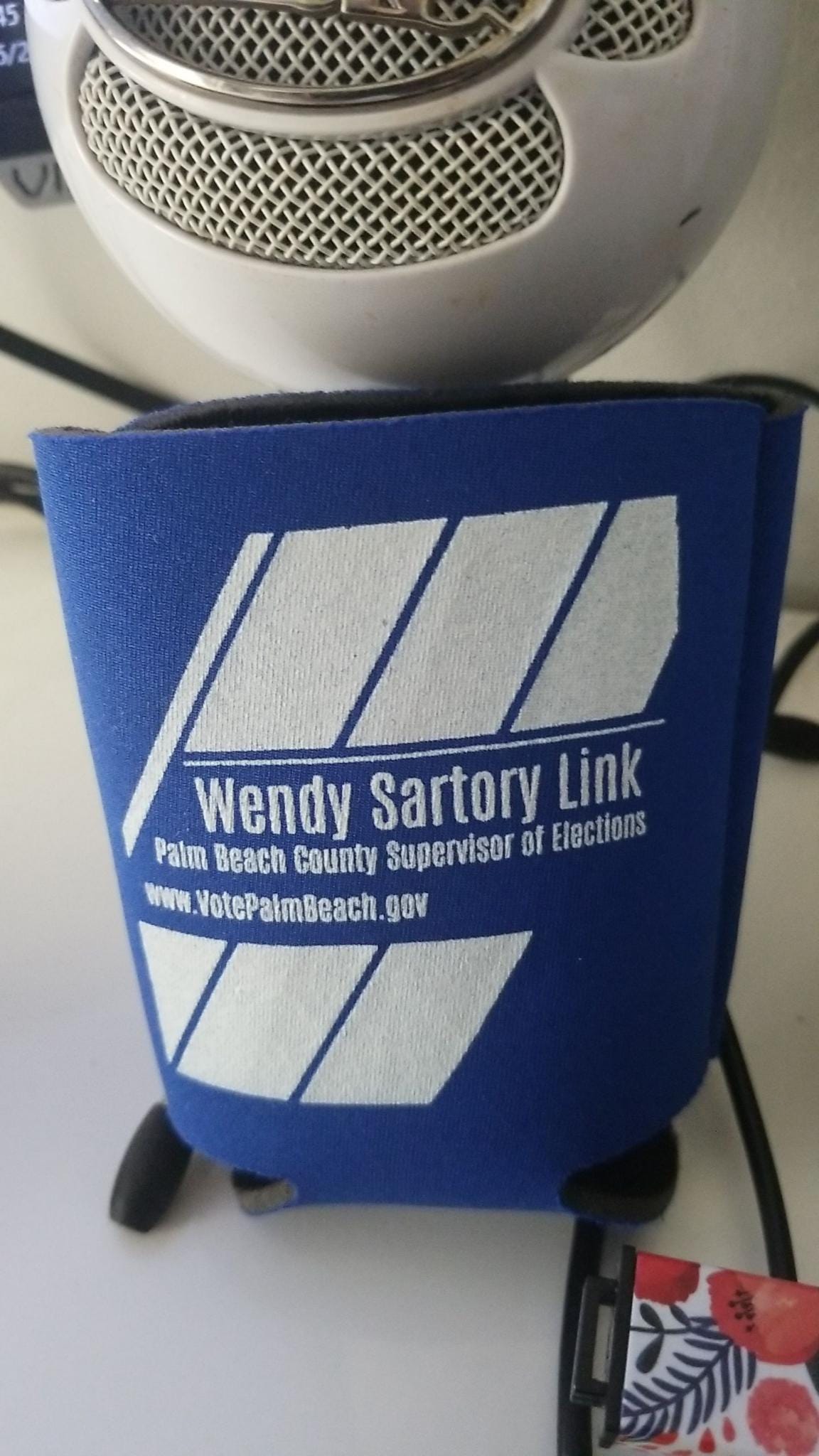
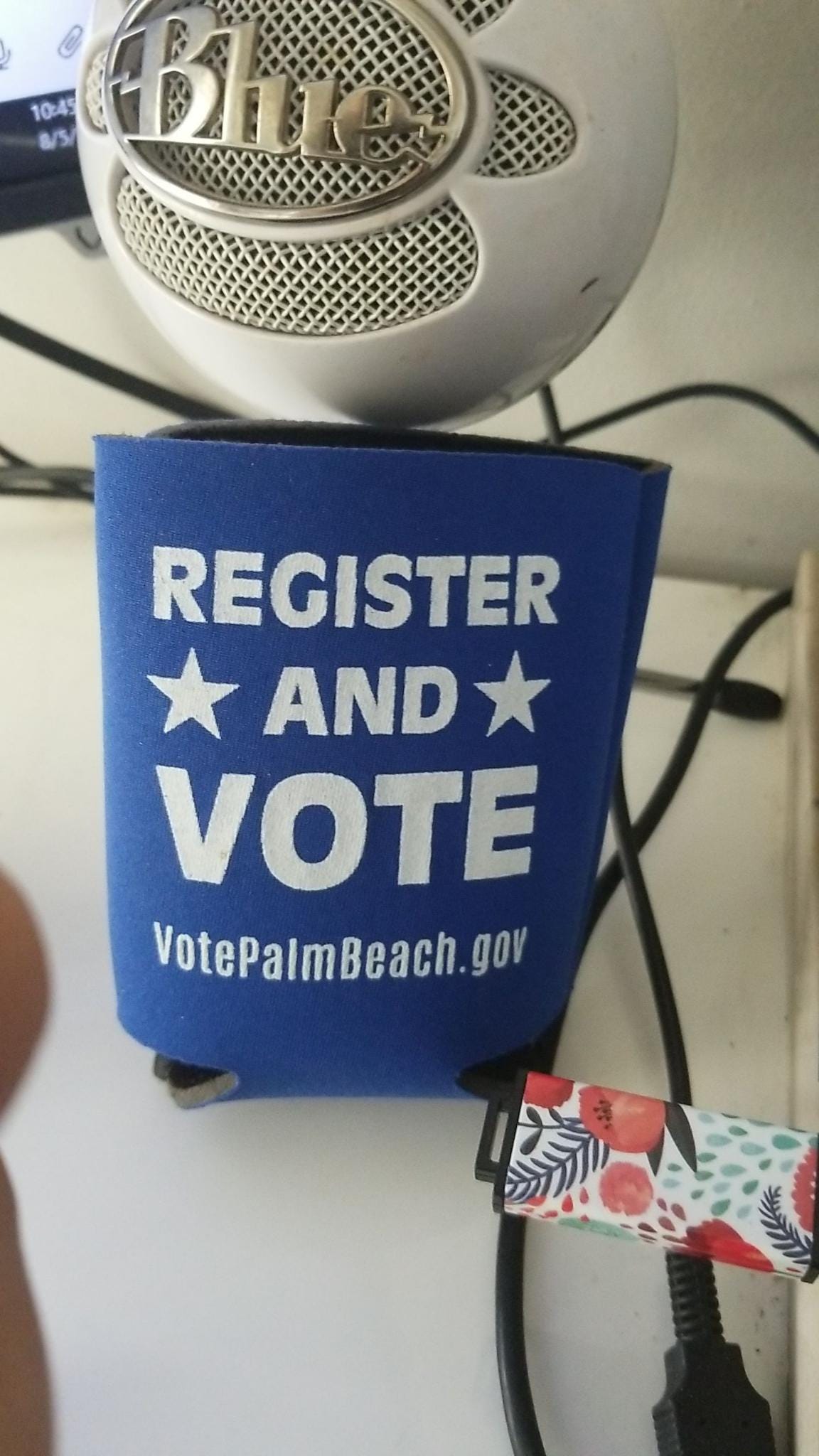
Did Wendy Sartory Link’s campaign pay for this or did the Palm Beach County Taxpayer pay for this?
How about mailers? Those are a huge cost for political campaigns.
The bulk of most campaign dollars are spend on mailers sent out to voters. This mailer was massively expensive. It went out to no less than 627,840 households in Pinellas County.
Do you know what the postage costs alone for sending out a campaign mailer to every single “voter” in Pinellas County would cost?
If the non-profit bulk mailer rate for this piece was say $0.35 per piece the cost would be approximately $219,744. That is quite a fabulous bump to a political candidate’s campaign.
Who paid for this mailer? Did the Julie Marcus campaign pay for this?
Did the Pinellas County Supervisor of Elections pay for this?
VOTE: Julie Marcus - Pinellas County Supervisor of Elections ?
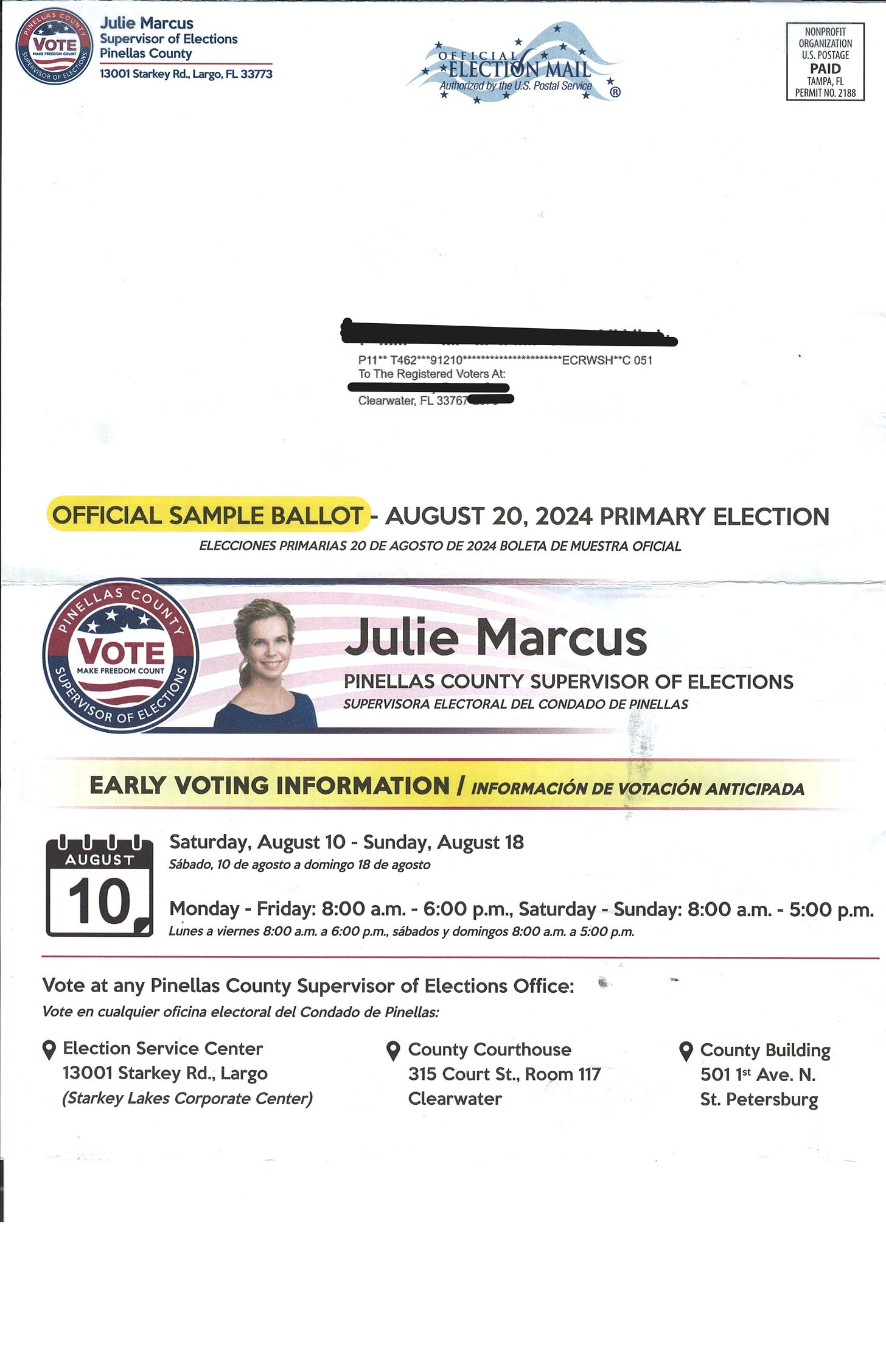
How about sending “Official Election Mail” to every single voter in a county telling them to “VOTE: JULIE MARCUS - Pinellas County Supervisor of Elections” ?
Why are taxpayers funding electioneering materials for incumbent candidates?
Is this waste, fraud, and abuse? Is this ethical? Is this legal?
In Florida, the use of public funds for electioneering or campaign expenditures is prohibited and is addressed under several statutes. The main statutes relevant to this issue are Florida Statutes 104.31 and 106.113.
Florida Statutes 104.31
This statute addresses political activities of public officers and employees.
Relevant Sections:
104.31(2): "An employee of the state or any political subdivision may not participate in any political campaign for an elective office while on duty."
104.31(3): "A person may not use the authority of their position to secure support for, or oppose, any candidate, party, or issue in an election or use any state, county, municipal, or district property for such purpose, except as authorized by law."
Explanation:
These provisions prohibit public employees from engaging in political campaign activities during working hours or using their official authority to influence elections. They also prohibit the use of government property or resources for political campaigns unless explicitly authorized by law.
Like these individuals who were at a Fourth of July parade…
Campaigning for Craig Latimer…
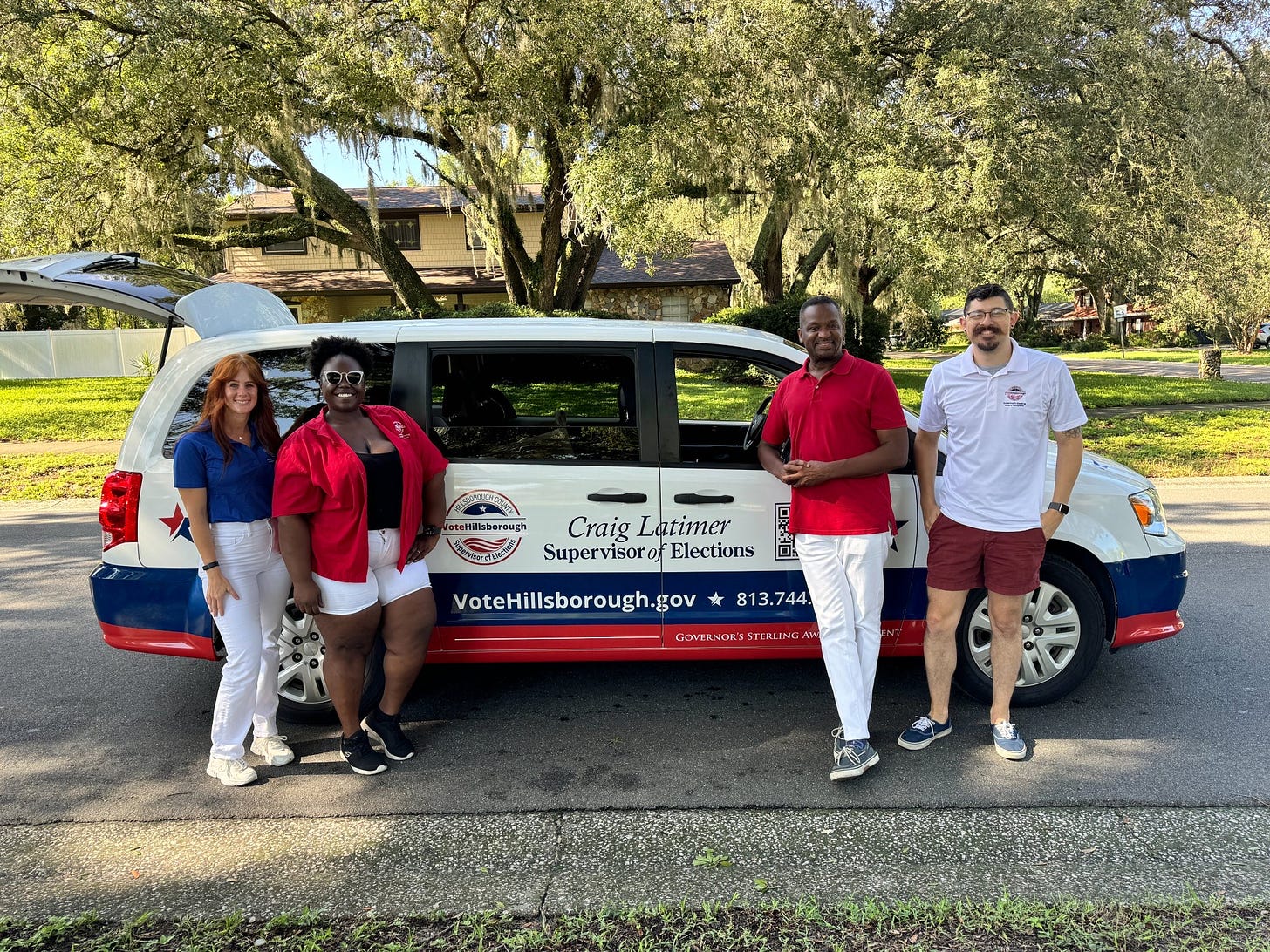
Florida Statutes 106.113
This statute specifically addresses the use of public funds for political advertisements or electioneering communications.
Text of the Statute:
106.113(1): "A local government or a person acting on behalf of local government may not expend or authorize the expenditure of, and a person or group may not accept, public funds for a political advertisement or electioneering communication concerning an issue, referendum, or amendment, including any state question, that is subject to a vote of the electors. This subsection does not preclude a local government from reporting on official actions of the local government body in an accurate, fair, and impartial manner."
106.113(2): "This section does not prohibit an elected official from expressing an opinion on any issue at any time."
Explanation:
This statute explicitly prohibits local governments from using public funds to pay for political advertisements or electioneering communications related to issues, referendums, or amendments subject to a vote. However, it allows for reporting on official actions in a fair and impartial manner and does not restrict elected officials from expressing their opinions on any issue.
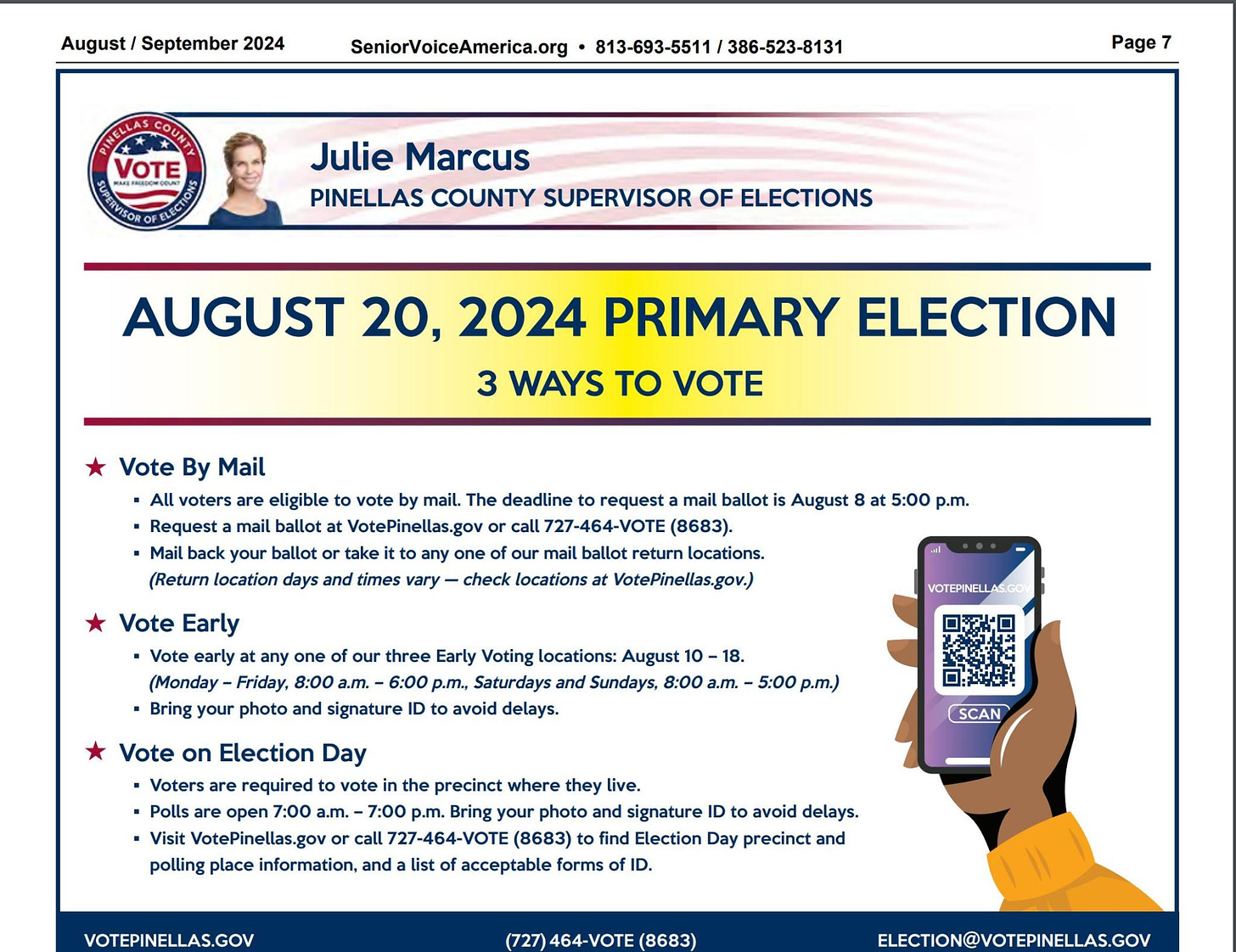
The advertisement above that clearly says VOTE: Julie Marcus Pinellas County Supervisor of Elections it was featured in the SeniorVoiceAmerica.org newsletter.
What did the Julie Marcus Campaign pay for this ADVERTISEMENT?
Or did the Pinellas County taxpayers pay for this VOTE: Julie Marcus Advertisement?
It could potentially be a violation of Florida Statutes if an incumbent supervisor of elections sends out a sample ballot as "Official Election Mail" with a vote logo placed next to their picture and name. The relevant statutes to consider in this scenario are Florida Statutes 104.31 and 106.113.
Possible Violations:
- Florida Statutes 104.31(2) and (3):
- 104.31(2) prohibits public employees from participating in political campaigns while on duty.
- 104.31(3) prohibits the use of public resources or the authority of one's position to influence an election.
- Florida Statutes 106.113(1):
- Prohibits the use of public funds for political advertisements or electioneering communications.
Key Considerations:
- Intent and Perception: The intent behind including the logo next to the incumbent’s picture and name and how it is perceived by the recipients are critical. If it is perceived as promoting the incumbent’s candidacy, it could be problematic.
- Content of the Mail: If the mail explicitly or implicitly encourages voting for the incumbent, this would strengthen the case for a violation.
- Authorization and Use of Public Funds: The use of public funds and resources for this mailing, if not strictly for informational purposes and perceived as campaign-related, would be a violation.
Example:
An incumbent supervisor of elections sends out an "Official Election Mail" sample ballot. The ballot prominently features a “Vote” logo directly next to their picture and name, creating a visual association between the act of voting and their candidacy. This could be perceived as using their official position and public resources to influence voters, potentially violating the mentioned statutes.
In conclusion, while the act of sending out sample ballots is typically within the duties of a supervisor of elections, the inclusion of campaign-like elements such as a vote logo next to the incumbent's picture and name could indeed raise legal and ethical concerns under Florida Statutes 104.31 and 106.113.
If a concerned citizen observes potential violations of Florida election laws, including those mentioned in Florida Statutes 104.31 and 106.113, they have several avenues to address these issues:
1. Filing a Complaint with the Florida Division of Elections
The Florida Division of Elections oversees the enforcement of election laws in the state. A concerned citizen can file a formal complaint detailing the alleged violation.
You can download the complaint form here:
The complaint should include:
- A clear description of the incident or violation.
- Any evidence supporting the claim (e.g., copies of the mailer, photos, statements from witnesses).
- Contact information for the complainant.
Contact Information:
- When completed, mail the complaint with your original signature to:
The Florida Elections Commission:
107 West Gaines Street,
Suite 224, Collins Building,
Tallahassee, FL 32399-1050
- Phone: 850-245-6200
- Email: [email protected]
2. Contacting the Florida Commission on Ethics
The Florida Commission on Ethics is responsible for investigating complaints regarding ethical breaches by public officials. A complaint can be filed if the violation involves misuse of public position or resources for personal or political gain.
Contact Information:
- Mailing Address: P.O. Drawer 15709 Tallahassee, FL 32317-5709
- Phone: 850-488-7864
- Fax: 850-488-3077
- Website: ethics.state.fl.us
3. Contacting the Local State Attorney’s Office
The local State Attorney's Office has the authority to investigate and prosecute violations of state law. A concerned citizen can report the violation directly to the office that serves their judicial circuit.
Pinellas/Pasco:
SIXTH JUDICIAL CIRCUIT
Bruce L. Bartlett, State Attorney*
14250 49th Street North, Room 1000
Clearwater, Florida 33762
(727) 464-6221
Hillsborough:
THIRTEENTH JUDICIAL CIRCUIT
Suzy Lopez, State Attorney
County Courthouse Annex, 5th Floor
800 East Kennedy Boulevard
Tampa, Florida 33602-4199
(813) 272-5400
Palm Beach County:
FIFTEENTH JUDICIAL CIRCUIT
Dave Aronberg, State Attorney
401 N. Dixie Highway
West Palm Beach, Florida 33401-4209
(561) 355-7100
Steps to Take When Filing a Complaint:
- Document the Violation: Collect all relevant evidence, including copies of the mailer, photographs, witness statements, and any other supporting documents.
- Write a Detailed Description: Clearly describe what you observed, why you believe it is a violation, and how it impacts the integrity of the election process.
- Submit the Complaint: Send your complaint to the appropriate agency (Division of Elections, Commission on Ethics, State Attorney’s Office).
- Follow Up: Keep track of your complaint and follow up with the agency to ensure it is being investigated.
Summary
Concerned citizens have multiple avenues for addressing potential violations of Florida election laws, including filing complaints with the Division of Elections, the Commission on Ethics, or the local State Attorney's Office. Raising public awareness through media and considering civil litigation are also possible courses of action.









